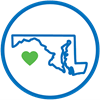
COVID-19 and Vaccine Resources for the Community
The COVID-19 pandemic has affected us all. Maryland hospitals and health systems are working 24/7 to keep you safe. This page offers information and resources to help inform Marylanders about COVID-19, safe and effective vaccines and boosters, and what they can do to help hospitals and the dedicated heroes who work there.
Questions or Concerns About COVID-19 Vaccine
Don't panic. The first thing to remember is that children are incredibly resilient. Most cases of COVID-19 in children are mild. Keep a close eye on your child and check in with your pediatrician, particularly if your child has underlying health conditions that may need monitoring.
CDC recommends everyone 12 years and older should get a COVID-19 vaccination to help protect against COVID-19. Widespread vaccination is a critical tool to help stop the pandemic. Children 12 years and older are able to get the Pfizer-BioNTech COVID-19 Vaccine.
COVID-19 vaccination is recommended for all people 12 years and older, including people who are pregnant, breastfeeding, trying to get pregnant now, or might become pregnant in the future.
Vaccinations are available through hospitals, local health departments, primary care providers, urgent care centers, and pharmacies. If you are eligible to receive a vaccine, contact providers as indicated to schedule your appointment.
COVID-19 vaccines are safe and effective. There could be some short-term side effects from the vaccine that go away in a day or two. These are signs that your body is building protection.
Where to Get a COVID-19 Test
Hospital Crisis Standards of Care
Ways to Talk to Others About Getting Vaccinated
Communication is key when it comes to talking to others about getting the vaccine against COVID-19. Here are ways to breach those conversations.

Stop the Spread of COVID-19
There are simple things everyone can do—and must do—to stop the spread of COVID-19.
- Get Vaccinated & Boosted, if eligible.
- Cover Your Face. Cover both your nose and mouth with a cloth mask whenever you are near people other than those you live with. This is the most worthwhile thing you can do.
- Keep Your Distance. Stay at least 6 feet apart from other people. That’s the minimum distance needed to keep airborne virus particles from reaching you, or the other person.
- Wash Your Hands. Wash them often, with soap and water for 20 seconds, or use a hand sanitizer that contains at least 60% alcohol.
- Cover Your Cough. Cough into a tissue or into your sleeve at the elbow.
- Avoid Close Contact with people who are sick.
- Avoid Large Crowds. Large gatherings, even outdoors, are one of the easiest ways to catch the virus. It is difficult to keep 6 feet apart at these events and there may be attendees who have traveled from outside your local area.
Maryland hospitals and their deeply committed caregivers are here for you if you need them. But let’s prevent the need altogether and save lives at the same time. Let’s all do our parts to keep ourselves, our families, and our communities safe and healthy.
What Is Coronavirus?
Coronaviruses are a group of viruses that cause respiratory tract infections. Some viruses cause mild colds, while others are more serious.
What Is COVID-19?
This new form of coronavirus was first detected in Wuhan City, Hubei Province, China and the disease it causes has been named “coronavirus disease 2019” or COVID-19.
Dr. Lisa Maragakis, Sr Director of Infection Prevention for The Johns Hopkins Health System, explains what COVID-19 is and how to help prevent transmission. (Feb 20)
What Should You Do If You Think You Are Sick with COVID-19?
Most cases of COVID-19 will not mean hospitalization, or even a trip to an emergency department. Hospital care is a resource that should be reserved for those with the most serious symptoms.
If you have recently traveled to any geographic area of concern or were in contact with someone with COVID-19, and you become sick with fever, cough or have difficulty breathing, seek medical care right away. Follow these steps:
- Call your doctor or hospital emergency department before you go
- Tell them about recent travel and close contacts (such as people in your household), who are ill
- Wear a face mask if one is available
- Follow the Centers for Disease Control guidelines
If you do not have severe symptoms:
- Continue to see your health care provider for regularly scheduled visits to address your other medical needs. Do not neglect your existing needs
- Masks will not prevent you from getting the virus, but they can help prevent the spread of the illness because they stop big droplets from sneezes and coughs from becoming airborne or contaminating surfaces
COVID-19 and the cold and flu season